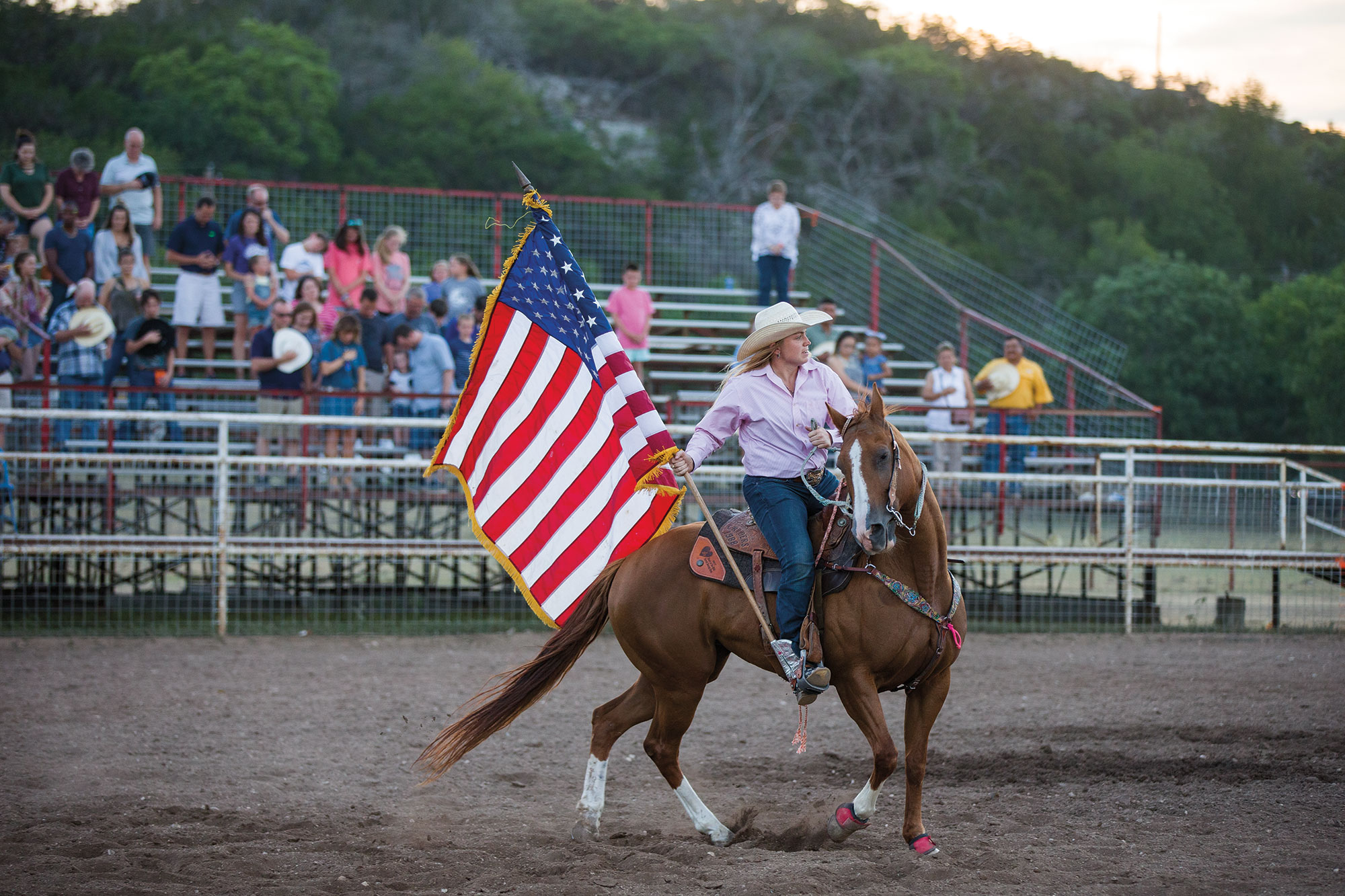
In its 95th summer in business, Crider’s Rodeo and Dancehall in Hunt has seen reduced crowds due to the coronavirus pandemic. Photo by Erich Schlegel
For 95 years, Crider’s Rodeo and Dancehall in Hunt has opened every summer to crowds eager for rodeo action and dancing under the stars along the Guadalupe River. In many ways, this year is no different—but in other ways, it is. On Saturday nights, Crider’s still hosts rodeo competitions for all ages and live music for dancing on a cement slab. But the usual steady stream of visitors has slowed to a trickle due to COVID-19. Tracy Moore, who oversees the café and dance hall, has kept the operations going, carrying on a family tradition that started in 1925. We checked in with Moore to find out how Crider’s has adapted.
How has the pandemic affected your turnout?
We opened Memorial Day weekend and have been open ever since then, since we’re an outside venue. The first four weeks we had a good turnout, but in the two after that we didn’t have even half of the crowds. The summer camps around here are operating, but at a smaller scale, and the camp counselors who usually come to the dance are quarantined at the camps. So we’re seeing an older crowd; it’s mostly family groups that hang with themselves.
How is the experience of coming to Crider’s changed?
When people show up, we check their temperatures in their car to make sure they don’t have a fever. We also take payment from their cars. We don’t charge separately for the rodeo and dance like we used to, now it’s just one price [$15] for both, and people can choose what they want to do.
Have you had to set limits on how many people you allow on the premises?
We haven’t had to limit capacity. It hasn’t been an issue because our numbers have been way down. We’re not even hitting 50 percent. We’re maybe at 30 to 35 percent capacity. We have plenty of room, so it’s easy for people to social distance in the bleachers and at the dance. We have about 20 acres around the facilities, so there’s lots of space.
Has your clientele changed during this time?
We have more locals at the dance, families staying within their own groups, parents dancing with kids. People are glad to have a place they can go. There are not many places you can take a family these days. The musicians are glad to have a venue, too. The Mark Odom Band said that they’ve had only nine gigs since February, and they called ahead to make sure this one wasn’t cancelled. A lot of rodeos have also been cancelled, since most arenas are city-owned or county-owned. We’re one of the few privately owned rodeos, so we’re not affected that way.
Do people need a reservation for the rodeo and dance?
You don’t need to make a reservation to come, and we don’t take reservations for tickets, but we do take some group reservations for the picnic tables. That’s a big draw. We filled up tables for the Fourth of July three weeks out, but some of those folks didn’t show up because of what was happening with the virus at the time.
Are you still serving food on Fridays and Saturdays?
Yes, we’re still serving our traditional Friday night catfish dinner, and the café is still open on Saturdays. The indoor dining room is closed, but people can eat at the picnic tables outside or get orders to go. Some regulars say that they’ve been waiting since last fall for our catfish!
How can people support Crider’s during this time?
We are about to have new T-shirts up for sale on our website. Another way people can support us is through buckle sponsorships for the rodeo. Probably the best thing you can do is through word of mouth, by letting everyone know that we’re still open. [Buckle sponsorships cost $400 and help pay for rodeo award buckles. It comes with two tickets. Contact Megan Bruinsma at 830-353-1111.]
What’s kept you going during these recent challenges?
A few weekends ago was our 95th anniversary. It was 95 years to the day since we had our first event on the Fourth of July. We’ve seen a lot of challenges in all that time. We’re not quitting now.
As the coronavirus pandemic continues to affect cities and towns across the state, Texas Highways asked our writers to share stories of adversity, recovery and strength in Texas’ small business community. We also checked in with businesses we’ve covered in the past and invited members of Texas travel associations to give us an update on how they’re doing and how you can support them. Click here to explore our map of nearly 500 small businesses.








